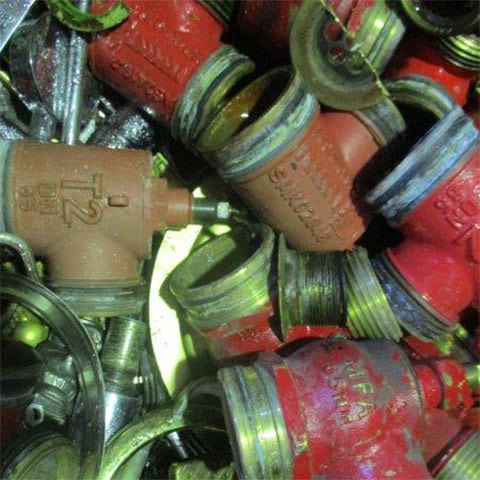Brass Scrap Metal

Brass Scrap Metal Recycling
Brass Scrap. Brass is a copper-based alloy. It is combined primarily with zinc but may also contain in varying quantities many other elements such as tin, arsenic, phosphorus, aluminum, manganese, and silicone. The characteristics of the various alloys means there is a wide range of uses for brass which include valves, plaques, musical instruments, pipe, cogs, machined fittings, plumbing, automotive, electrical, and hydraulics.
Brass has significant economic and environmental benefits as you can recycle it repeatedly without losing any physical or chemical properties.
Brass is a soft metal that may be used in cases when a low chance of sparking is necessary such as applications where gas or another accelerant may be present.
Brass is of historical and enduring importance because of its hardness and workability. The earliest brass, called calamine brass, dates to Neolithic times; it was probably made by reduction of mixtures of zinc ores and copper ores and was used to form spear tips and other weaponry as well as tools and jewelry. Later times saw the uses include plaques for identifying and honoring the dead and buried.
Some alloys known as the alpha brasses, are widely used in the manufacture of pins, bolts, screws, and ammunition cartridge cases. The beta brasses are less ductile but stronger and thus are suitable for the manufacture of faucet handles, sprinkler heads, window and door fittings, and other fixtures. A third group of brasses includes those with other elements besides copper and zinc, added to improve physical and mechanical properties, corrosion resistance, or machinability or to modify colour. Among these are the lead brasses, which are more easily machined; the naval and admiralty brasses, in which a small amount of tin improves resistance to corrosion by seawater; and the aluminum brasses, which provide strength and corrosion resistance where the naval brasses may fail.
Bronze (another copper alloy) is harder than copper as a result of alloying that metal with tin or other metals. Bronze is also more fusible (i.e., more readily melted) and is hence easier to cast. It is also harder than pure iron and far more resistant to corrosion. It is often utilized in statues and architecture or in machine parts that require extra tensile strength.
Recycling of scrap brass exceeds 11000 metric tonnes per annum across Australia. The manufacturing sector produces a small percentage of this material, but the overwhelming majority of scrapped brass comes from the demolition and building industries in the form of plumbers brass such as taps, plumbing pies, door handles, and brass fittings.
The price of brass is primarily dictated by the value of it’s copper content and as a result the value has more than doubled as a scrap item in the past 3 years due to the huge increase in the copper market value. The current brass price is as high as $8.00 per kilogram or $8000.00 per tonne.
Top Dollar Metal Recyclers has recycled more than 3500 tonnes of brass in the last twenty years and has an ongoing commitment to supply both local and international markets.

